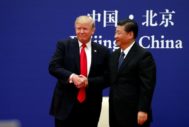Authors
Collin Norkiewicz

Collin Norkiewicz is a program manager and research associate with the China Power Project at CSIS, where he focuses on Chinese foreign and security policy, US-China bilateral relations, and cross-strait relations. Prior to joining CSIS, he was a research assistant at the Carnegie-Tsinghua Center for Strategic Studies, where he assisted in researching US-China bilateral relations and emerging disruptive technologies. Norkiewicz graduated with an M.A. in Law and Diplomacy, focusing on International Security Studies and Pacific Asia from Tufts University’s Fletcher School of Law and Diplomacy. He received a B.A. in International Relations and Global Studies with a focus on International Security and East Asian Studies from The University of Texas at Austin.
Articles by Collin Norkiewicz

US - China
September — December 2017State Visit-Plus Summit Buys Time, But Friction Mounts
Donald Trump was hosted in Beijing for a “state visit-plus” summit in early November, the third stop on his almost two week-long Asia tour. In response to North Korea’s September nuclear test and December ICBM test, the US and China worked together at the United Nations to tighten sanctions. Cracks in their cooperation widened, however, as Trump pressed Beijing to cut crude oil supplies to North Korea and Xi called for negotiations. US investigations into alleged Chinese unfair trading practices continued and remarks by Trump administration officials suggest that there is a growing possibility of the US imposing harsh trade penalties on China in 2018. Major bilateral dialogues convened in the last four months of the year included the social and people-to-people dialogue, the cyber security and law enforcement dialogue, the inaugural US-China Consultation on Foreign Nongovernmental Organization Management, and the first talks between the joint staff departments of the US and Chinese militaries. The Trump administration issued its first National Security Strategy, which depicted China as a rival and a revisionist power that, along with Russia, is seeking to erode US security and prosperity.

US - China
May — August 2017North Korea and Trade Dominate the Agenda
The Trump administration’s focus on increasing pressure on North Korea to abandon its nuclear and missile programs kept that issue at the top of the US-China agenda. In phone calls and a meeting between Presidents Trump and Xi Jinping on the margins of the G20 Summit, at the Diplomatic and Security Dialogue, and at the ASEAN Regional Forum, North Korea received the greatest attention as the US urged Beijing to use its economic leverage against Pyongyang in a bid to change Kim Jung Un’s calculus. After a seven-month hiatus, the US resumed freedom of navigation (FON) operations in the South China Sea, conducting one operation in the Spratly Islands in May and another in the Paracel Islands in July. Marine Corps Gen. Joseph Dunford made his first visit to China as chairman of the US Joint Chiefs of Staff. The first Comprehensive Economic Dialogue convened, but made little progress in easing bilateral economic friction. In August, the Trump administration formally initiated a Section 301 investigation into China’s theft of intellectual property.